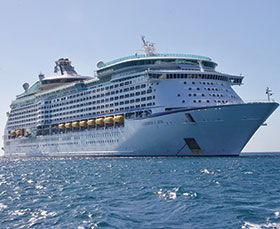

Infrared thermography is a widely-accepted preventive maintenance technology, both for land-based and maritime applications. Electromechanical assets like motors, especially on ships where both vibration and airborne contamination can be problematic, are often susceptible to sudden unexpected failure. Maintenance and repair is not an easy task on a vessel at sea and, every three to five years, cruise lines send their ships into dry dock for both aesthetic upgrades as well as routine maintenance.
After completing its research, a large cruise ship builder determined that its fleet of ships should retrofit IR windows as an alternative method of conducting inspections. Critical electrical equipment was identified and IRISS VPT-75 windows were installed into panel covers in the engine room. It was determined that more frequent inspections of energised equipment could be attained by retrofitting IR windows for routine inspections, which did not trigger elevated levels of PPE as required by regulation, thus also reducing inspection time and maintenance costs. The maintenance team decided to integrate infrared thermography as a first line of defence, and thermal imaging is now being used to capture baseline images and trends on all critical electrical equipment.
When the ship was brought in for scheduled dry-dock, the electrical equipment was completely de-energised and the windows were retrofitted. Approval to re-energise and operate the equipment was obtained and locks and tags were removed. The electricians confirmed the equipment was operating at normal load levels and allowed sufficient time for the equipment to become thermally stable. Infrared thermography was then performed on the equipment and any issues were noted. Inspections are now scheduled on a semi-annual basis and spot checks are performed whenever any warning signs are picked up by maintenance and operations staff.
An ROI with savings in time and money was achieved through the implementation of IRISS transparent polymer infrared windows. This allows more frequent inspections and additional regulatory safety compliance was also achieved. Even though many of the practices are similar in the marine industry to those of land-based thermography, there are different potential problems, concerns and safety issues that most land-based thermographers would never encounter. Thermography for the marine industry is just as important to overall equipment reliability as it is for land-based installations.
| Tel: | +27 11 608 1551 |
| Email: | [email protected] |
| www: | www.randci.co.za |
| Articles: | More information and articles about R&C Instrumentation |

© Technews Publishing (Pty) Ltd | All Rights Reserved